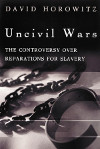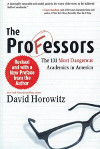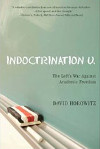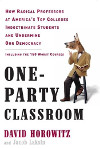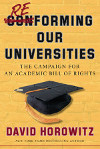Indoctrination U Reviews
No Shock, Just Facts: Liberal Indoctrination on Campus
By C. Chumley
May 01, 2007
Originally published at HumanEvents.com
“Cream pie,” writes David Horowitz, in his latest exposé of malfeasance in higher education, is “deeply … sexual.”
Well, not really.
Not all in one place, anyway. “Cream pie” comes from page 20, “deeply,” from page 41, and “sexual,” page 37.
But the book isn’t titled “Indoctrination U: The Left’s War Against Academic Freedom” for nothing. And if the standards set by the nation’s intellectual elite might be stretched outside the classroom — and their guiding principle of “no higher principle, except for that which furthers personal political bias and politically charged correctness” might be applied in these outer arenas — then most certainly, to some, David Horowitz believes in the aphrodisiac powers of cream pie.
Laughable as it would seem, this outright fabrication very nearly reflects the true day-to-day affairs in America’s supposed hallowed halls of higher learning, according to Horowitz’s findings, which come as a sort of follow-up to his previous book, “The Professors: The 101 Most Dangerous Academics in America” (Regnery, a Human Events sister company.) But while “The Professors” focused on people and on holding those individuals responsible for the decay of American education, “Indoctrination U” points to the failing system as a whole — the insidious usurpation of college administration, policy, and course and class offerings by sundry Marxists, Socialists and anti-Americans who seek nothing less than to brainwash students with the politically favored causes of the day.
It used to be, Horowitz writes, that “in a democracy, the purpose of an education [was] to teach students how to think, not what to think.” These principles were held in such high regard that they were encapsulated in “the more formal phrasing of the 1915 ‘Declaration of Principles’ on academic freedom.” Horowitz continues, quoting the declaration’s entreaty that students not be provided with “ready-made conclusions,” but rather trained to “think for themselves,” and that professors act more as facilitators and provide “access to those materials which they need … to think intelligently.”
And now?
Now students at such honored places as the University of California, Santa Cruz, are treated to the musings — or ravings, depending on your point of view — of faculty radicals who morph certain classes that are already left-of-liberal into the arenas of the extreme and fanatical. Take the Women’s Studies Department, for example. “This anti-intellectual development in higher education is … manifest [here],” Horowitz writes, referring to the professor-led preference for a new departmental name: Feminist Studies. “Its curriculum represents an undisguised program of ideological indoctrination in the theory and practice of radical feminism. This includes the recruitment of students to radical causes.”
Or consider Peace Studies at Ball State University — another thinly veiled “recruitment and training” ground. Here, the indoctrination focuses on “left-wing politics and anti-military attitudes” pushed by a professor schooled, not in military history or political science or even international affairs, but in music. The Peace Studies professor is a music teacher. He’s a “performance artist in the Department of Music,” Horowitiz writes. “His academic credential is a doctorate in education and his specific expertise is the saxophone.” Perhaps that explains this professor’s bizarre text selection: He chose Peace and Conflict Studies, which advocates violence of the revolutionary kind so long as it brings the types of tremendous gains as seen in Cuba, where life nowadays is “generally improved.”
Horowitz’s reaction to these ill-disguised brain-washings was to create and promote an Academic Bill of Rights for students, making clear the mission of a university is to provide an atmosphere for “the pursuit of truth, the discovery of new knowledge … the teaching and general development of students,” and so forth. And because higher learning has failed so thoroughly in these regards, Horowitz also took steps to promote a similar document for grades K-12, the breeding ground for the university-level abuses.
This latest book details Horowitz’s success in bringing these documents to formal adoption by America’s schools and universities. But, for example, here’s how the battle’s being waged, as illuminated by the sarcastic reception of a union leader who caught wind of the document as it wound through the State University of New York system for administrative review and consideration.
It’s an “Academic Bull of Rights,” he quipped.
Of Rights and Character Assassination: A Review of Indoctrination U
By Bernard Chapin
Feb 24, 2007 – 11:05:14 AM
From Magic City Morning Star
Should Conservadom, in the spirit of positive reinforcement, ever decide to create awards for its most valuable commentators, it is quite likely that David Horowitz will be summoned to the podium each and every year until the time of his death. Few other figures have so resolutely, and creatively, battled the left over the course of the past two decades. His ingenuity, zeal and sense of humor are apparent in the titles of his works, such as How to Beat the Democrats and Other Subversive Ideas, The Art of Political War and Other Radical Pursuits, and Hating Whitey and Other Progressive Causes. His careful and inflammatory choice of wording is again discernible in his latest release, Indoctrination U: The Left’s War Against Academic Freedom. The book is essentially a postscript to last year’s The Professors: The 101 Most Dangerous Academics in America as it provides an antidote to the toxins disseminated by the 101 pseudo-scholars detailed within.
The cure Horowitz offers to the propagandizing of the bottom10 percent of the professorate is called The Academic Bill of Rights. The context and story behind Indoctrination U is the author’s attempt to gain publicity for the proposition. Having it enacted by state legislatures was never his primary goal. What he sincerely desired was for universities to preemptively adopt its essence into their own bylaws.
The Bill itself is reproduced in an appendix. Its language is well-crafted and rather innocuous, yet one would never know this from the reaction it received from its critics. They dubbed it “crazy, Orwellian, a witch hunt,” and totalitarian in nature. Their disparagement is perhaps a ruse to better enable them to protect their own privilege as tenets like, “No faculty shall be hired or fired or denied promotion or tenure on the basis of their political or religious beliefs” is not the stuff of McCarthyism. Although, should it be rigidly interpreted, a clause like, “Faculty will not use their courses for the purpose of political, ideological, religious or anti-religious indoctrination” would completely threaten the activists’ way of life. Commandments like that are far more threatening than having their beloved Fairness Doctrine applied to network news broadcasts or NPR.
The story within this story is the way in which his enemies eschew discussion of the document in favor of excoriating Horowitz. They had several opportunities to do so as he posed for them repeatedly atop a podium during his college speaking tour. Wherever he went, he was alchemized into a resolution for debate. A trip to one California state school saw him become the first conservative invited there in its 11 year history while at Butler he got hit in the face with a pie [stunning argumentation]. Even more absurd was the warning an administrator gave just before he commenced his speech at the University of Chicago. She noted that a safe room was available should the speaker’s words prove too harrowing for youthful ears to tolerate. His presentation at Reed College was unexpectedly rebutted by the Dean who had little to say about the Academic Bill of Rights but denounced Horowitz as a “political pornographer.” The dean’s spiel was actually encouraging because pressure from his superior brought about an apology. Horowitz was met by protestors at Penn State even though the university’s Policy Manual contains the same type of restrictions on instructor behavior which are outlined in the Bill.
Those who actually discussed the initiative were generally dismissive. One proclaimed it a “solution in search of a problem.” How much better off the country would be if such a view was correct. The liberal arts programs within our universities have become leftist bastions whose purpose is no longer to pursue truth. Unlike with the sciences, whose colleges are the finest in the world, numerous liberal arts departments have become completely politicized and are little more than ad hoc centers of agitprop.
Many of our tenured luminaries even question whether there is such a thing as truth or objectivity at all. Their skepticism makes for all kinds of classroom mischief as they idolatrously worship the troika of race, class, and gender. What “social justice” should mean is that the citizenry has the right to keep what they’ve earned, but, in the mouths of radicals, it is morphed into a description of government’s attempt to pit one social group against another via an arbitrary, and authoritarian, redistribution of wealth scheme. Political correctness functions as the academy’s Cerberus. It tyrannizes the marketplace of ideas and uses wonderland logic to turn its critics into peddlers of hate speech.
Some have argued that the professorate’s overwhelmingly leftist slant fails to prove that any discrimination in hiring transpired—even though they would never repeat these same words regarding the proportion of minorities within a particular business or profession. Theoretically, this is true but there is no shortage of evidence documenting the penchant anti-liberal utopians have for barring the impure from their ranks. None of this really matters though as the Bill has no provision for the hiring of conservatives. What’s done is done. The hope for people like Horowitz is that public awareness of past wrongs will allow for the future to be salvaged.
Given his adroitness and experience, the author could not have been too surprised by the reaction he received from those in the bunkers of the Ivory Tower because his appearances were intentionally provocative. The speech he gave at Duke is transcribed in these pages. It turned out to be quite inspiring which meant that half of the audience either fainted or walked out. The Director of the Anthropology Studies program recommended that her students strip to the waist as a form of protest but the wards failed to follow her order; although, Horowitz was met with the bizarre tactic of synchronized giggling. Irrational backlash like that is to be expected as emotionality and obstruction have been the left’s weapons of choice since humans first found a way to end words with “ist” and “ism.”
In the final analysis, what good has come from the imbroglio over The Academic Bill of Rights? Well, there have been some mild successes. Princeton University passed a “Student Bill of Rights” while Temple University enacted a policy to prevent students from being politically bullied in the classroom. According to Horowitz, over 20 projects similar to Penn State’s Center for the Study of Free Institutions and Civic Education have been created as a means to instill intellectual diversity into our universities. Of course, for the foreseeable future, the only accolades academe will win for tolerance are ones it bestows upon itself.
Length, or a lack thereof, is the lone reservation this reviewer has about Indoctrination U. Another four or five chapters would have been mightily appreciated. Horowitz admits that there were many attacks and accusations that he chose not to document, but we would be better off if he had. Not only do these “teachable moments” provide proof of perpetual injustice, they also make for serious entertainment. Seinfeld would have difficulty dreaming up material as goofy as the “safe room” comment in Chicago.
Bernard Chapin is a writer living in Chicago who is the author of Escape from Gangsta Island: A School’s Progressive Decline and is currently at work on a book concerning women. He can be contacted at veritaseducation@gmail.com
